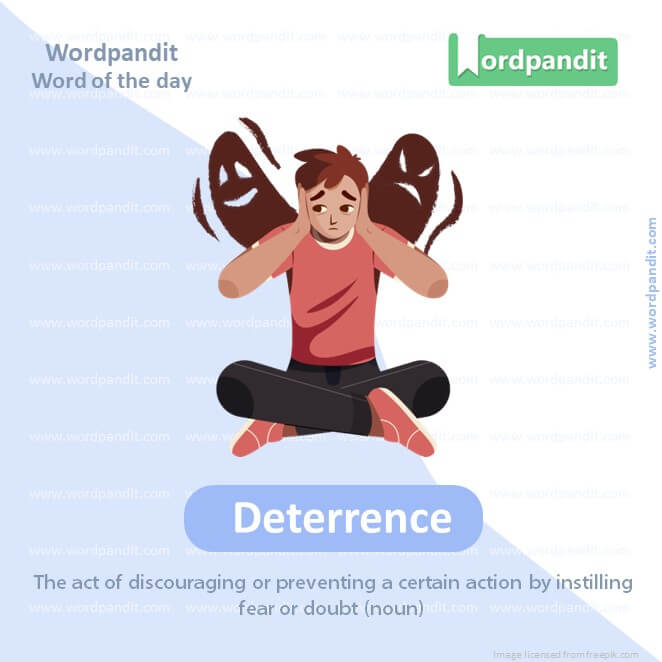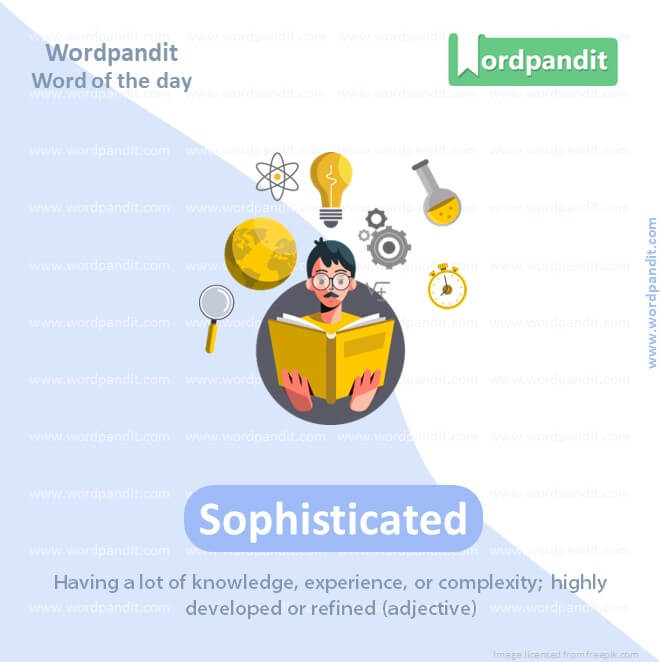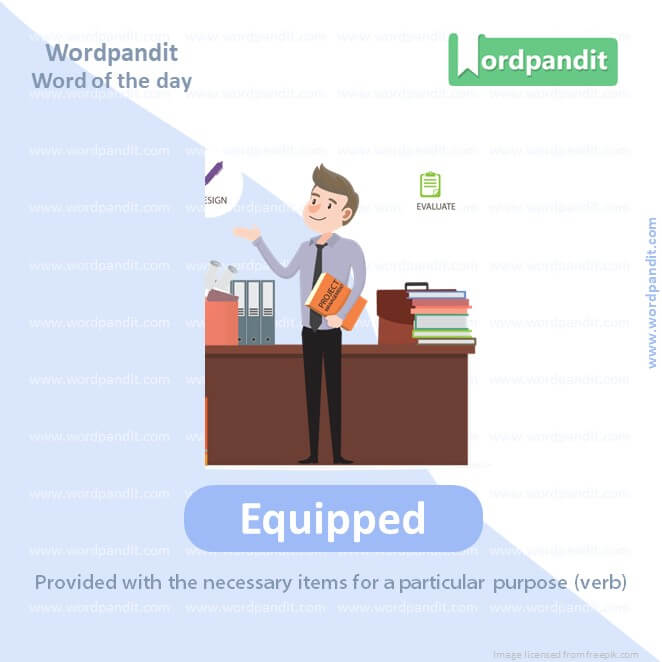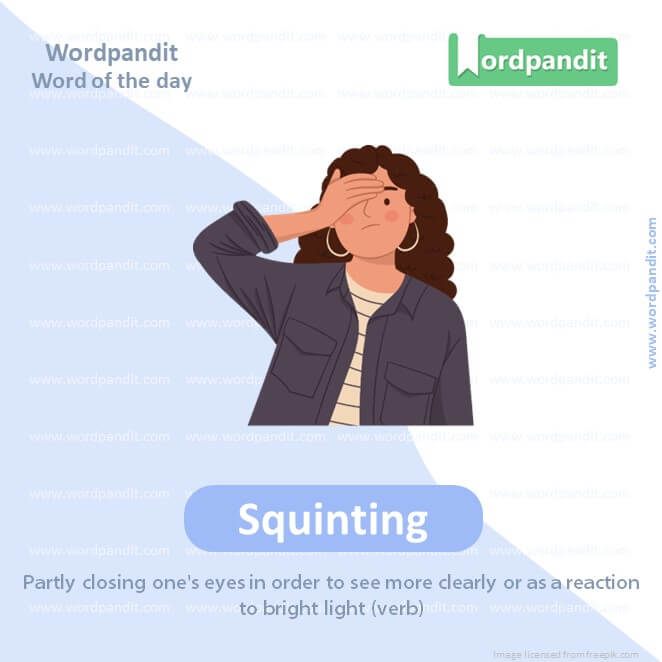Daily Vocabulary Words: List of Daily Used Words in Leading International Newspapers
Hi there. Welcome to this special section @ Wordpandit.
Our endeavour here is very simple: to highlight important daily vocabulary words, which you would come across in leading newspapers in the country. We have included the following newspapers in our selection:
• The New York Times
• The Washington Post
• Scientific American
• BBC
• The Guardian
• Psychology Today
• Wall Street Journal
• The Economist
We are putting in extensive work for developing your vocabulary. All you have got to do is be regular with this section and check out this post on a daily basis. This is your repository of words that are commonly used and essentially, we are posting a list of daily used words. Hence, this has significant practical application as it teaches you words that are used commonly in leading publications mentioned above.
Visit the website daily to learn words from leading international newspapers.

WORD-1: Deterrence
CONTEXT: There is actually a stable balance of deterrence there right now.
SOURCE: New York Times
Explanatory Paragraph: Imagine you have a big, scary-looking toy spider that you use to keep your little brother from sneaking into your room. The spider scares him a little, so he stays out. This is like deterrence: it’s using something to prevent someone from doing something they shouldn’t, like the spider keeps your brother out of your room.
Meaning: The act of discouraging or preventing a certain action by instilling fear or doubt (noun).
Pronunciation: deh-TEHR-uhns
Synonyms: prevention, discouragement, intimidation, dissuasion, inhibition
Usage Examples:
1. The country’s strong military acts as a deterrence against attacks.
2. Putting up a fence served as a deterrence to trespassers.
3. The harsh penalties served as a deterrence to would-be criminals.
4. The alarm system serves as a deterrence to burglars.

WORD-2: Sophisticated
CONTEXT: They have learned to arm, build, adapt and deploy some of the most sophisticated precision weaponry in the world. That weaponry, provided by Iran, can hit a three-foot-wide target 500 miles away.
SOURCE: New York Times
Explanatory Paragraph: Imagine if you had a robot that could do homework, make snacks, and even clean your room without you telling it every little step. That robot would be very smart and know how to do lots of things. That’s what sophisticated means: something or someone that is very smart, knows a lot, or is really good at doing things.
Meaning: Having a lot of knowledge, experience, or complexity; highly developed or refined (adjective).
Pronunciation: suh-FIS-ti-kay-tid
Synonyms: complex, advanced, refined, cultured, elegant
Usage Examples:
1. She has sophisticated taste in art and music.
2. The new software is more sophisticated than its predecessor.
3. The plan required sophisticated thinking and strategy.
4. They attended a sophisticated gala in the city.

WORD-3: Arrayed
CONTEXT: The young U.S. soldiers and sailors arrayed against them cut their teeth on video games, but now find themselves playing the real thing, deploying with software and cursors the world’s most sophisticated countermeasures and interceptors to swat away almost every rocket and drone the Iranian proxies have been throwing at them.
SOURCE: New York Times
Explanatory Paragraph: Imagine you have a collection of action figures, and you line them up on your shelf in a special order, maybe from your favorite to least favorite, or by color. This is like arraying them: you’re setting them up in a particular way, so they look nice or make sense to you.
Meaning: Placed or arranged in an orderly, often attractive, formation (verb).
Pronunciation: uh-RAYD
Synonyms: arranged, aligned, ordered, assembled, deployed
Usage Examples:
1. The soldiers were arrayed in formation for the parade.
2. The table was arrayed with a variety of delicious foods.
3. She arrayed her collection of dolls on the shelf.
4. The stars were arrayed across the night sky.
WORD-4: Reconstituting
CONTEXT: these bases were designed and situated to block ISIS from reconstituting its supply lines and critical mass, they were never meant to deter or attack the vast modern rocket arsenals of Iran and its proxies.
SOURCE: New York Times
Explanatory Paragraph: Imagine you have a puzzle that you’ve finished and then taken apart. If you decide to put the puzzle back together again, you’re reconstituting it. It means putting something back to how it was before, like rebuilding your puzzle so you can see the whole picture again.
Meaning: Putting something back together again that has been taken apart or broken down (verb).
Pronunciation: ree-KON-sti-too-ting
Synonyms: rebuilding, restoring, reassembling, re-forming, reconstructing
Usage Examples:
1. After the flood, they focused on reconstituting their home.
2. The chef is reconstituting the dried mushrooms by soaking them in water.
3. The committee was tasked with reconstituting the organization’s guidelines.
4. Scientists are working on reconstituting the extinct species through genetic technology.
WORD-5: Unscathed
CONTEXT: A soldier in the bunkhouse right next to the one hit told us he was talking to his wife on FaceTime when the drone struck; protected by a thick cement barrier, he emerged shaken but unscathed.
SOURCE: New York Times
Explanatory Paragraph: Imagine riding your bike and taking a big tumble, but when you get up, you don’t have a single scratch, and you’re totally fine. That means you came out unscathed: you weren’t hurt or damaged at all, even though it seemed like you might be.
Meaning: Not harmed or damaged in any way (adjective).
Pronunciation: un-SKAY-thd
Synonyms: unharmed, untouched, undamaged, intact, safe
Usage Examples:
1. Despite the accident, she walked away unscathed.
2. The book survived the coffee spill unscathed.
3. Their reputation remained unscathed after the scandal.
4. The city was surprisingly unscathed after the storm.

WORD-6: Equipped
CONTEXT: It was equipped with six swordlike blades that once it penetrates a vehicle slice and dice anything in their path like a blender, which is why the missile has been nicknamed the “Flying Ginsu.”
SOURCE:New York Times
Explanatory Paragraph: Imagine if you were going camping and you packed a tent, a sleeping bag, a flashlight, and snacks. That means you’re equipped: you have everything you need to have a good time camping in the woods.
Meaning: Provided with the necessary items for a particular purpose (verb).
Pronunciation: ih-KWIPT
Synonyms: outfitted, supplied, furnished, armed, provided
Usage Examples:
1. The soldiers were well equipped for the mission.
2. Her kitchen is equipped with the latest gadgets.
3. The team was equipped with protective gear for the game.
4. The new car is equipped with advanced safety features.

WORD-7: Squinting
CONTEXT: the first, and often last, line of defense is usually a 20-something U.S. soldier or sailor squinting at a computer screen, trying to decide with software within seconds what is coming his or her way and engaging the right countermeasures.
SOURCE:New York Times
Explanatory Paragraph: Imagine you’re outside on a really sunny day, and the light is so bright that you can’t see very well. So, you partly close your eyes to try to see better. This is called squinting. You do it to help your eyes see things when it’s too bright or hard to see.
Meaning: Partly closing one’s eyes in order to see more clearly or as a reaction to bright light (verb).
Pronunciation: SKWINT-ing
Synonyms: peering, blinking, narrowing eyes, looking closely, shading eyes
Usage Examples:
1. She was squinting to read the sign in the distance.
2. He found himself squinting against the bright sunlight.
3. Squinting, she tried to make out the figure approaching them.
4. They were squinting at the screen to see the details.
WORD-8: Embodied
CONTEXT: We don’t swear an oath to a person or a king, we swear an oath to an idea, embodied in the Constitution and ingrained in our democracy, that all men and women are created equal.
SOURCE: New York Times
Explanatory Paragraph: Imagine your favorite superhero and how they always stand up for what’s right, help people, and fight villains. Your superhero shows what it means to be brave and kind. This is like embodying: it’s being a perfect example or representation of something, like how your superhero embodies bravery and kindness.
Meaning: Represented in a physical form or an example of an idea, quality, or feeling (verb).
Pronunciation: em-BAH-deed
Synonyms: personified, represented, exemplified, incarnated, manifested
Usage Examples:
1. She embodied the spirit of volunteerism in her community.
2. The statue embodied the courage of the soldiers.
3. The new policy embodied the company’s commitment to sustainability.
4. He embodied the qualities of a true leader.
WORD-9: Enlistee
CONTEXT: this one an enlistee who had worked his way up — repeats as he or she rises in rank.
SOURCE:New York Times
Explanatory Paragraph: Imagine if someone decided to join a group, like a team or a club, but this group is special because it’s for helping and protecting the country, like the army. This person has chosen to be part of that group to help out. That person is called an enlistee because they signed up to be in the army.
Meaning: A person who has voluntarily signed up for military service (noun).
Pronunciation: en-LIS-tee
Synonyms: recruit, volunteer, soldier, draftee, service member
Usage Examples:
1. The enlistee completed basic training last month.
2. As a new enlistee, she was eager to serve her country.
3. The ceremony honored the courage of young enlistees.
4. Enlistees were given a brief on what to expect during deployment.
WORD-10: Muffled
CONTEXT the two soldiers holding up their little Stars and Stripes that provided the only color in this vast brown tableau, and the oath of allegiance to an idea, not a king, muffled by the protective blast walls of this far-flung base in a region that has mostly known only the opposite.
SOURCE:New York Times
Explanatory Paragraph: Imagine you’re trying to listen to music through your headphones, but you’re also wearing a hat and scarf because it’s cold. The music might sound quieter and not as clear as usual. That’s because the sound is muffled: it’s being blocked or made less loud by something, like your hat and scarf.
Meaning: A sound that is made quieter or less clear by something blocking it (adjective).
Pronunciation: MUH-fuhld
Synonyms: muted, softened, stifled, subdued, dampened
Usage Examples:
1. The muffled sounds of the city could be heard from the apartment.
2. She spoke in a muffled voice through the door.
3. The muffled music from the party next door kept them awake.
4. He tried to listen to the muffled conversation happening outside.
Vocabulary English Words
In the enchanting performance of language learning, ‘vocabulary English words’ make up the musical notes that help us create harmonious communication. Mastering these words can seem like an arduous task at times; however, using the right learning strategies can make the process of learning ‘vocabulary English words’ smooth and enjoyable.
A crucial principle for learning ‘vocabulary English words’ is to focus on understanding, rather than memorizing. Engaging with varied materials such as novels, news articles, podcasts and digital content will expose you to a wide range of words in different contexts, giving a deeper insight into their meaning and usage.
Employing memory-enhancing techniques can significantly aid in the learning of ‘vocabulary English words’. Tools such as flashcards, language-learning apps, and mnemonic strategies ensure an effective and long-term learning experience. Mnemonic devices, linking words with personal and relatable stories or images, can help in creating better associations and improving recall.
Practice plays a vital role in mastering ‘vocabulary English words’. Using the new words in your routine conversations, written correspondence, or even digital interactions adds a practical aspect to your learning, making these words a part of your active vocabulary.
Furthermore, leisure activities such as crosswords, word games, or simple vocabulary quizzes are effective ways to make the learning of ‘vocabulary English words’ fun and interactive.
To conclude, the journey of learning ‘vocabulary English words’ demands a multi-faceted approach woven into our daily life. A balanced mix of understanding, usage of memory-enhancement tools, active application, and leisure activities can considerably ease the process of mastering ‘vocabulary English words’. Remember, each word learned is a tiny victory, bringing you one step closer to impeccable fluency and articulate expression in the beautiful symphony of the English language.











